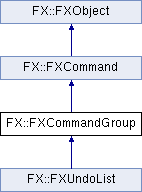
 |
Main Page Class Hierarchy Alphabetical List Compound List File List Compound Members
|
Group of undoable commands. More...
#include <FXUndoList.h>

Public Member Functions | |
| FXCommandGroup () | |
| Construct initially empty undo command group. | |
| FXbool | empty () |
| Return true if empty. | |
| virtual void | undo () |
| Undo whole command group. | |
| virtual void | redo () |
| Redo whole command group. | |
| virtual FXuval | size () const |
| Return the size of the command group. | |
| virtual void | clear () |
| Clear list. | |
| virtual | ~FXCommandGroup () |
| Delete undo command and sub-commands. | |
 Public Member Functions inherited from FX::FXCommand Public Member Functions inherited from FX::FXCommand | |
| FXival | nrefs () const |
| void | ref () |
| void | unref () |
| virtual FXString | undoName () const |
| Name of the undo command to be shown on a button; for example, "Undo Delete". | |
| virtual FXString | redoName () const |
| Name of the redo command to be shown on a button; for example, "Redo Delete". | |
| virtual FXbool | canMerge () const |
| Return true if this command could possibly be merged with a previous undo command. More... | |
| virtual FXuint | mergeWith (FXCommand *command) |
| Called by the undo system to try and merge the new incoming command with this command. More... | |
 Public Member Functions inherited from FX::FXObject Public Member Functions inherited from FX::FXObject | |
| const FXchar * | getClassName () const |
| Get class name of some object. | |
| FXbool | isMemberOf (const FXMetaClass *metaclass) const |
| Check if object is member of metaclass. | |
| virtual long | tryHandle (FXObject *sender, FXSelector sel, void *ptr) |
| Try handle message safely, catching certain exceptions. | |
| virtual long | onDefault (FXObject *, FXSelector, void *) |
| Called for unhandled messages. | |
| virtual void | save (FXStream &store) const |
| Save object to stream. | |
| virtual void | load (FXStream &store) |
| Load object from stream. | |
| virtual | ~FXObject () |
| Virtual destructor. | |
Friends | |
| class | FXUndoList |
Group of undoable commands.
Complicated manipulations may sometimes be more effectively implemented as a combination of multiple sub-commands. The CommandGroup implements this concept by invoking each the sub-commands undo() and redo() in the proper order. For example, a network editing program may decompose a "Delete Node" operation into a number of connection changes followed by a unconnected node removal operation. Note that some sub-commands may themselves be also CommandGroup items. You start a new CommandGroup by creating an instance of CommandGroup cg and calling undolist.begin(ch), and end it by calling undolist.end(). In between, additional CommandGroup items may be created as well, keeping in mind that the inner CommandGroup must be closed with undolist.end() before adding to the outer CommandGroup. They are strictly nested.
|
|